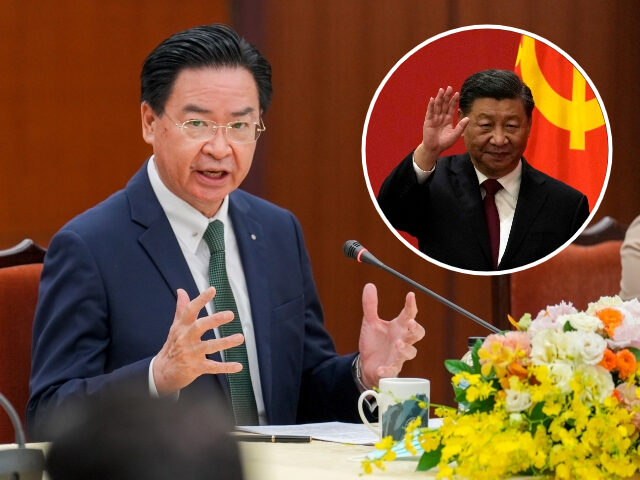Taiwanese Foreign Ministry Joseph Wu told Sky News on Wednesday that China is growing “more likely” to invade as Chinese dictator Xi Jinping’s domestic problems grow more serious.
Wu suggested 2027 was the most probable year for the invasion to begin.
Wu selected 2027 because it would be the year after Xi is supposed to leave office, his unprecedented third term having finally expired. Wu believes Xi will still be clinging to power with a white-knuckled grip:
In 2027, Xi Jinping is likely to go into his fourth term, and, if in his previous three terms he cannot claim any achievement during his office, he might need to think about something else for him to claim as his achievement or his legacy.
If you look at the Chinese situation right now, the economy is going down. People are not happy, the real estate business seems to be melting down.
If Xi Jinping cannot change the situation domestically in China, you might want to resort to a use of force or creating a crisis externally to divert domestic attention or to show to the Chinese that he has accomplished something. We are concerned that Taiwan might become his scapegoat.
Wu did not expect the years between 2023 and 2027 to be free of risk, or incident. He noted that China’s now-constant provocations into Taiwan’s Air Defense Identification Zone (ADIZ) carry an escalating risk of forcing Taiwanese pilots to respond – which might be what China wants, as it seeks a pretext for all-out war.
“Look at the proximity of the Chinese aircraft to our aircraft. If they cross the 24 nautical miles zone, some of our weapons systems might have to target those Chinese aircraft, and that might spark an accident, even though it might not be intentional for the Chinese pilots to cross the 24 nautical miles,” he explained.
“Very often, you see the sum of a tiny little accident might spark into a major war,” he warned, crediting the discipline of Taiwanese pilots for avoiding such an incident to date.
On Monday, a Chinese pilot gave an interview with state media in which he claimed to have actually flown over Taiwan undetected in a J-20 stealth fighter – penetrating not only the ADIZ but Taiwan’s protected airspace.
“I said to myself at that time, I will fly over in the future! There is no such thing as the Taiwan Strait. This line or that line!” Captain Yang Jucheng exclaimed, referring to the unofficial but long-recognized buffer zone running through the middle of the Taiwan Strait.
Asked about criticism that Taiwan spends too little on defense and is unprepared for a full-blown Chinese invasion, Wu said his government admits that it might not have “acquired sufficient ammunition” or “sufficient training for our military personnel” until now, but President Tsai Ing-wen is addressing these shortfalls through measures such as an increased defense budget and longer terms of mandatory military service. Conscription for men will be extended from four months to a full year beginning in 2024.
The Taiwanese military on Wednesday announced plans for women to join its reserves as volunteers for the first time, beginning with a group of 220 former female soldiers. Until now, Taiwan has limited the reserves to male volunteers because it lacked the resources to accommodate women. Women are not conscripted but they can join the regular military as volunteers, and usually serve in support roles.
“We are trying everything we can to make Taiwan prepared, to make Taiwan capable of defending itself,” said Wu.
Wu said Taiwan is ready to negotiate various issues with China, provided Beijing does not impose “political preconditions.”
This was most likely a reference to China’s refusal to engage in serious negotiations while President Tsai holds office. The regime in Beijing regards Tsai as a “separatist” and has waged relentless diplomatic and economic war against Taiwan ever since she took office.
“Accepting those Chinese preconditions means that we are submitting to China, and that is something that the people here in Taiwan would never accept, but our door is open,” Wu said.

COMMENTS
Please let us know if you're having issues with commenting.